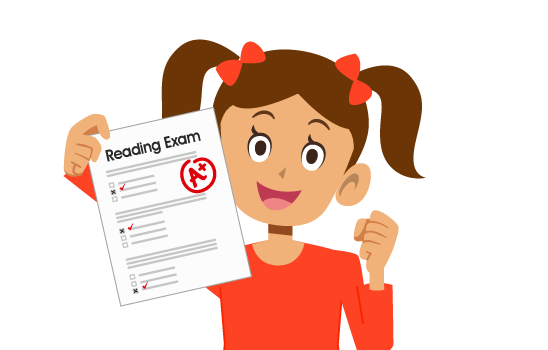In 2015, only 36% of the United States’ fourth grade students performed at or above the “proficient” level in reading in national reading assessments. Although these assessments are only one part of the full picture of student performance, they indicate that, on the whole, elementary students need additional reading support. After all, reading skills affect a student’s success not only in language arts, but in every curriculum subject.
Parents whose children fall into this underperforming category need to know how to develop reading skills that will prepare them for the rigors of middle and high school coursework. Let’s take a closer look at what tends to cause deficits in reading skills. Then, we’ll focus on some ways to improve student achievement in reading.
The Root Causes of Reading Issues
Outside of a diagnosed reading disability, problems with student reading usually come down to one or more of these three main issues:
- decoding issues
- comprehension issues
- retention issues
Decoding issues usually involve difficulties with sounding out words, and may cause students to read slowly and to read aloud without expression. Students struggling with reading comprehension may be able to decode what they are reading but may not be able to understand its meaning. Even if a student can decode and comprehend what they are reading, retention issues can cause a student to have trouble summarizing and remembering what they have read.
How to Improve Reading Test Scores
If you have a child in one of these underperforming states, or if your own student’s reading test scores have caused concern, there are steps your child can take to improve standardized test scores in reading.
Strategies for Building Decoding Skills
A strong foundation in phonics instruction is usually the solution for most decoding issues that students have. Phonics should be systematically integrated into a student’s reading and language arts program. This should start in the pre-reading period with letter-sound relationships and continue through early elementary with spelling strategies and mastery of words with multiple syllables. Parents can aid their child with decoding by:
- pointing out “irregular” words when reading — words that don’t fit the normal phonics rules.
- find creative ways to practice letter combinations such as forming them in playdough, drawing them with sidewalk chalk, and tracing them in shaving cream.
- have them practice finding specific cans of food in the grocery store by sounding out the letters of the item (e.g., li-ma-beans).
- play word-based board games such as Boggle™ and Sequence Letters™.
How to Improve Reading Comprehension Skills
Reading comprehension goes beyond simply decoding letters and words and requires students to interact with the text. This is a skill that can actually be introduced in the pre-reading stage. Even when you are reading books to your toddlers and preschoolers, you should occasionally stop and ask questions about what you’re reading to ensure that they are understanding the meaning behind the words and images. Reading comprehension strategies for older students might include:
- having your child read books aloud to you and taking time to discuss the themes and flow of the story together.
- reading a section from a book to your child and asking them to describe what they envision about the scene by using sensory language.
- model inference as you read together (e.g., “The girl in the story just said she felt like her head was inside a balloon and her eyes were so heavy she could barely see the clock. What do you think was going on with her?”)
Strategies for Enhancing Reading Retention
Many times, if a child can’t hold onto what he/she has just read, there is a mental disconnect. It’s possible that your student doesn’t have the personal background to make connections between what’s being described and something in their own life. It’s also possible they aren’t taking the time to visualize the scenes as they unfold. To help your student build retention, you might try:
- having him use different color sticky notes for different situations. (e.g., pink for when the setting changes, blue for when a character does something interesting, green for when something unexpected happens, etc.). Just the act of interacting with the text so often will train your child’s brain to remember more of what is being read.
- seeing if your child can retell what’s just happened in the story after every few pages.
- asking her to think of something the story made her curious about, and then taking the time to look up the answer.
Parents wondering how to improve reading skills at home have many options. In addition to the strategies outlined above, there are interactive online reading programs that use animation, learning games, and fun educational activities to encourage children to practice often. Helping a child reach reading proficiency doesn’t happen overnight, but parents who are committed to their child’s reading success will be glad to know that with time and attention, even underperforming readers can reach grade-level testing goals.








Working with students after school.
Hi Billie, thanks for stopping by! Time4Learning can be an excellent resource for parents looking for after school enrichment and/or skill building. You can learn more here: https://www.time4learning.com/skill-building.html
If you need further info or if we can try to help, please feel free to reach out to our customer support team! https://www.time4learning.com/curriculum/contact_us.php
Isabella is on the right track. This is more elaboration. Reading comprehension and retention may be accomplished by periodically stopping and asking oneself pertinent questions about theme/plot and characters, noting the questions; then, read the selection again to answer your own questions. One must be seeking the answers as one reads. Also note (from memory) the relationship between characters by mapping them out. (Mind Map –https://en.wikipedia.org/wiki/Mind_map — ) . always reread to achieve answers. (might help to learn how to increase one’s reading speed, even for third graders). Especially note the first, most prominent, or important places and times. (these show up on tests). The objective is to learn, but also enjoy reading and gathering information. j
This is great information. I would add that when you are trying to improve test scores specifically for a child that has a hard time remembering what they read, you can go back and forth to the passage question by question. I’m not sure if this is the best strategy or not, but when my son has his standardized tests coming up, I usually go over the subjects with a bunch of questions and have him re-read the passage with that question in mind. That way he knows what he is looking for. It might take longer but it definitely does the trick for him.